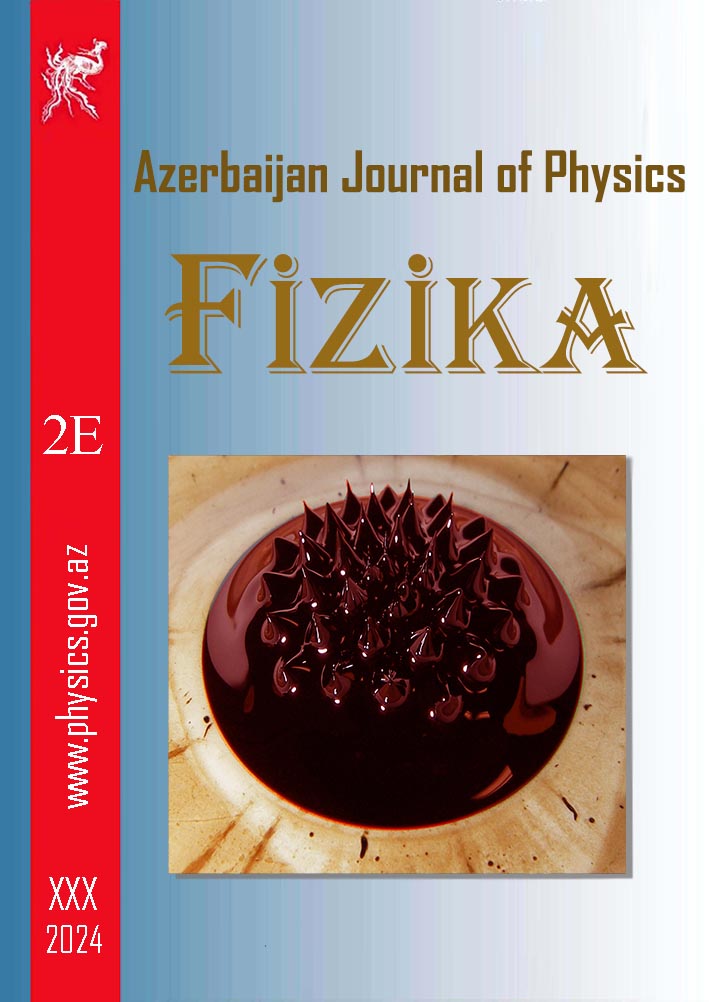ABSTRACT
The radial distribution of current density from the center of the beam to the edges across the radius of the emission field was investigated using a miniature probe target
placed at a specific distance from the emission point at various beam current values from a liquid metal ion source with InSb as the working substance. It has been
observed that despite the consistent geometric dimensions of the emission area at various emission current values, the current density decreases at measurement points from
the center of the beam towards the edges. The experimental results provide the maximum opportunity to adjust the dimensions of thin layers deposited on various substrates
using the ion source, as well as to ensure uniform thickness distribution across the surface of the samples.
Keywords: ion source, working substance, ion beam, radial distribution, emission.
PACS: 29.25. Ni; 52.25 Th; 81.16. RF
DOI:-
Received: 22.09.2023
AUTHORS & AFFILIATIONS
Institute of Physics, Ministry of Science and Education of the Republic of Azerbaijan, 131 H. Javid Avenue, Baku, AZ 1143, Azerbaijan
E-mail: mammadov.f.e@gmail.com
Graphics and Images

Fig.1
|
REFERENCIES
[1] Lothar Bischoff, Paul Mazarov, Lars Bruchhaus, and Jacques Gierak. Liquid metal alloy ion sources—An alternative for focussed ion beam technology. Applied Physics Reviews 3, 021101 (2016); https://doi.org/10.1063/1.4947095
[2] Mazarov P., Dudnikov V.G., Tolstoguzov A.B. Electrohydrodynamic emitters of ion beams. Phys. Usp. 63 1219–1255 (2020); https://doi.org/10.3367/UFNr.2020.09.038845
[3] I.S. Gasanov, I.I. Gurbanov. About the sizes of emitters of ions and nanoparticles in point sources. Applied physics № 1, 2010, p. 55-57.
[4] I.S. Gasanov, I.I. Gurbanov. Nanostructure operations by means of the liquid metal ion sources. Review of scientific instruments 83, 02 B 906 (2012) https://doi.org/10.1063/1.3670340
[5] I.S. Gasanov, I.I. Gurbanov. Formation of Charged Nanodroplets at Capillary Instability of the Liquid Emitter. Japanese Journal of Applied Physics Vol. 47, № 10, 2008, pp. 8226–8229 https://doi.org: 10.1143/JJAP.47.8226
[6] P.D. Prewett, G.L.R. Mair. Fokused Ion Beams from Liquid Metal Ion Source. Research Studies Press, 1991 https://doi.org/10.1016/0042-207X(92)90309-K
[7] Klinqner N. et al. Imaging and milling resolution of light ion beams from helium ion microscopy and FIBs driven by liquid metal alloy ion sources. Beilstein J. Nanotechnol. 2020, 11, 1742–1749. https://doi.org/10.3762/bjnano.11.156
[8] W. Driesel, C. Dietzsch. In situ HVTEM observation of the tip shape of tin liquid metal ion sources. Applied Surface Science, Vol 93, Issue 2, 1 February 1996, p.179-190, https://doi.org/10.1016/0169-4332(95)00326-6
[9] Chase S. Coffman, Manuel Martínez-Sánchez, and Paulo C. Lozano. Electrohydrodynamics of an ionic liquid meniscus during evaporation of ions in a regime of high electric field. Phys. Rev. E 99, 063108, 26 June 2019 https://doi.org/10.1103/PhysRevE.99.063108
|
